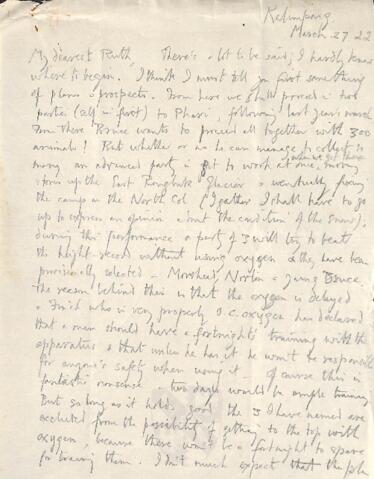Identity area
Reference code
Title
Date(s)
- 27-28 March 1922 (Creation)
Level of description
Extent and medium
1 item, paper
Context area
Name of creator
Archival history
Content and structure area
Scope and content
Letter to Ruth Mallory, from 'Kalimpong’.
Brief Summary
Split into 2 groups. Plan to beat height record without using oxygen. Training by Finch on use of oxygen. 40 men selected which wasn't enough. Travelled by train up the Teesta Valley. Finch and Crawford left behind to wait for delayed oxygen cylinders. Description of flowers.
Detailed Summary
They had split into two parties with himself in the first group and travelled to Phari following the previous year’s march. General Bruce had wanted to travel all together with 300 animals. Describes Bruce and the management of the advance party moving stores, fixing camps, and he expected to share his opinion about the condition of the snow when the time came. During the expedition they planned that a party of three would try to beat the height record without using oxygen. They had been provisionally selected - Morshead, Norton, and young Bruce.
Finch was insisting on oxygen training and had declared that a man should have a fortnight’s training with the apparatus and that unless he had it he wouldn’t be responsible for anyone’s safety when using it. Thinks two days would be ample training. If this rule held good the three he named were excluded from the possibility of getting to the top with oxygen, because there wouldn’t be a fortnight to spare for training them. He didn’t expect the plan would work out exactly according to intention as he thought General Bruce wouldn’t be rigid on the matter.
There were only 40 porters in the party which was quite inadequate. They were good men selected from 150 Nepalese and among them were 14 who had climbed with him the previous year. He reckoned they would have to make about four journeys to the North Col and two journeys up from there to 25,000 ft which he thought was asking too much. Bruce had been short on time and couldn’t gather more men worth taking or equip them. He planned to save them as much as possible on the journey and possibly gather a few Tibetans.
He was enjoying the venture hugely as it wa the jolliest of parties and everything was well arranged. General Bruce, Wakefield, Strutt, Noel and himself were going down to Siliguri while, ‘young Bruce’ had gone ahead to look after the luggage. He had returned after dinning in the station to find their beds already set up and arranged with mosquito nets which he thought was the proper way to travel, although the net wasn’t very effective and he was bitten and had to use iodine and prophylactic quinine. He hoped to escape fever.
They had travelled up the Teesta Valley to railhead with General Bruce putting his head out of the window most of the time, brimming over with joy and waving his handkerchief at passers-by, and Noel had used his cinema apparatus [film camera]. He describes the heat, and of arranging stores before going up to Teesta Bridge. From there the General walked up about 4,000 ft.
They came round by train to save 300 rupees but the rest preferred to start early that morning motoring out from Darjeeling about 8 miles and then walking. His companions from there would be Bruce, Norton, Longstaff, and Noel. Finch remained behind at Darjeeling with Crawford to bring the oxygen. They would probably be about 10 days behind them which he felt was rather hard luck for them. That night he was sharing a room with Longstaff and he thought they would get on together very nicely.
He would describe his time in Darjeeling, but it would be largely of idleness. He had been walking with Wakefield, Norton, and Somervell but the mountains were not at their best. Describes specific flowers and their glorious colours, but thinks they were not as loveable as English blossoms. Everything seemed to be in waiting for the first rain showers. He did not expect to see as many flowers in Sikkim until they came to the rhododendron zone.
He had ordered Curtis to give her a book which should be useful in identifying wild flowers and thought perhaps she could collect some flowers with Clare.
Appraisal, destruction and scheduling
Accruals
System of arrangement
Conditions of access and use area
Conditions governing access
Conditions governing reproduction
Language of material
Script of material
Language and script notes
Physical characteristics and technical requirements
Finding aids
Allied materials area
Existence and location of originals
Existence and location of copies
Related units of description
Notes area
Alternative identifier(s)
Former Reference
Access points
Subject access points
Place access points
Name access points
- Bruce, Charles Granville (1866-1939), army officer and mountaineer (Subject)
- Morshead, Henry Treise (1882–1931), surveyor, explorer and mountaineer (Subject)
- Norton, Edward Felix (1884-1954), army officer and mountaineer (Subject)
- Finch, George Ingle (1888–1970), chemist and mountaineer (Subject)
- Wakefield, Arthur William (1876-1949), medical officer and mountaineer (Subject)
- Strutt, Edward Lisle (1874-1948), lieutenant colonel and mountaineer (Subject)
- Noel, John Baptist Lucius (1890-1989), mountaineer and photographer (Subject)
- Bruce, John Geoffrey (1896-1972), army officer and mountaineer (Subject)
- Longstaff, Tom (1875-1964), doctor, explorer and mountaineer (Subject)
- Crawford, Colin Grant (1890-1959), mountaineer (Subject)
- Mallory [née Turner], Ruth (1892-1942), wife of mountaineer George Mallory (Subject)
